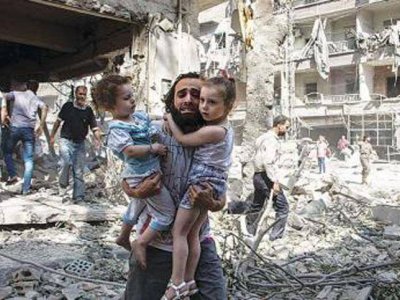
THE WRONG PLACE AT THE WRONG TIME
God is to be found in the worst places of the world. He is waiting for our prayers to linger with him long after such news has become boring to us.
Dresden, Hama, Grozny, Aleppo, Mosul.
A desperate litany of cities razed to the ground in total war, to which can now be added Raqqa. There has been little coverage of the battle to wrest Raqqa from the hands of Islamic State. The situation has been so perilous that few news companies have been willing to put reporters into the crossfire; the chances of kidnapping by any number of parties a risk too great to contemplate. The horrendous destruction has largely passed us – and our prayers – by.
How lonely sits the city
That once was full of people!
How like a widow she has become
These are the opening words of the Book of Lamentations, most likely an eye witness account of the destruction of Jerusalem by the Babylonian army in 587BC. A lively, colourful, historic city reduced to nothing; its people taken into captivity. Like jumping into a freezing winter lake, reading the book evokes a profound shock which the reader only acclimatises to slowly and in which it is only emotionally possible to stay for short periods. There is grief, despair, anger, bitterness, guilt, loathing and humiliation. The people have been ruined.
We see the wreckage in the photographs taken of a destroyed city like Raqqa and shudder at the devastation wrought. In a peaceful society governed by law, careful planning permission is needed to make changes to property. People can object, and sometimes do, when an extension affects the feel of a neighbourhood. Tempers and relationships are often frayed by the smallest of changes. Living in this milieu, it is impossible to get our minds round what happens to people when bombs and missiles raze a town to the ground and those who flee are caught in the sniper’s crosshairs. We simply have no experience to help us understand.
It is surprisingly easy not to see beyond the rubble; not to imagine what happens to those caught in the middle. Unlike buildings, human beings are not so easily put back together, especially those who are young and lack the emotional and rational capacity to address the noise, the smell and the fear of war. Reading the Book of Lamentations gives an ancient, poetic insight into the inner carnage of the human mind. But mostly we cherry pick its verses, especially those which speak of the steadfast love of the Lord never ceasing. This is not inherently wrong, for the promises of God are irrevocable. But a better sense of the context of some promises gives a firmer foundation to what we believe and why, and into the minds of those who live the Book of Lamentations today.
A city like Grozny has been rebuilt, to leave few clues to the ferocity of the war in the 1990s. Its children are now in their 30s and 40s, child-bearing age. To understand the welfare of Grozny today is not to marvel at its shiny newness; it is to see into the hearts of those who remain profoundly scarred and haunted by what happened.
The city of Raqqa may not easily be rebuilt while the region remains volatile and violent, subject not just to the capriciousness of local militants, but to the machinations of bigger countries. Its fate stands for what is cruel and life-denying in this world.
Our prayers tend to follow the shape of the television news, which means Raqqa has probably not received the intercession it deserves in many countries. Those who lived there were in the wrong place at the wrong time. Most have fled; many will never return. They carry with them the deepest trauma of violence and displacement and, as citizens of Raqqa, will be tainted by association with Islamic State. Their children, in particular, are some of the most vulnerable in the world.
Is it nothing to you, all you who pass by?
Look and see if there is any sorrow like my sorrow
We all have selective eyesight and glaze over sights we find uncomfortable. The chances are that our digital newsfeeds, alert to our preferences, shield our eyes from places of lament like Raqqa. God is to be found in the worst places of the world. He is waiting for our prayers to linger with him long after such news has become boring to us.
POPULAR ARTICLES

Obama's Covert Wars
The use of drones is going to change warfare out of all recognition in the next decades.

Through A Glass Starkly
Images of traumatic incidents caught on mobile phone can be put to remarkable effect.

What Are British Values?
Is there a British identity and if so, what has shaped the values and institutions that form it?


